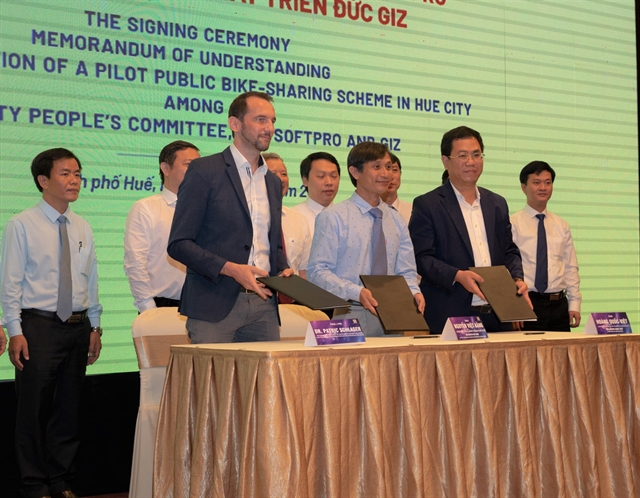 Environment
Environment

An innovative public bike-sharing scheme has been launched by Huế City, the International Co-operation Agency of Germany (GIZ) and tech firm Vietsoftpro to develop a bicycle transportation plan for 2021-2026 that mobilises private investment for bike-sharing.

|
| Representatives of the central Huế city, International Co-operation Agency of Germany (GIZ) and Vietsoftpro sign a Memorandum of Understanding (MoU) for an innovative Public Bike-Sharing (PBS) scheme. It will help develop bicycle transportation plan for 2021-2026 that mobilizes private investment for bike-sharing public services in Huế city. Photo courtesy GIZ |
THỪA THIÊN-HUẾ — An innovative public bike-sharing scheme has been launched by Huế City, the International Co-operation Agency of Germany (GIZ) and tech firm Vietsoftpro to develop a bicycle transportation plan for 2021-2026 that mobilises private investment for bike-sharing.
GIZ said the memorandum of understanding (MoU), which was signed during ‘Moving to Digitalisation’ week in the city in late April, promised a public-private partnership (PPP) between Huế and the GIZ to support public bike-sharing.
The partnership model is supported by the DeveloPPP fund, a financing mechanism of the German Federal Ministry for Economic Cooperation and Development (BMZ), and managed and implemented by the GIZ under the umbrella of the ‘Support to Việt Nam for the Implementation of the Paris Agreement (SIPA)’ project.
The DeveloPPP mechanism aims to encourage private sector contributions to the sustainable development objectives of local governments, according to GIZ. Vietsoftpro is the first Vietnamese company to receive direct technical support under DeveloPPP since it opened to local enterprises in late 2019.
Under the partnership model, Vietsoftpro is responsible for the development and maintenance of the bike-sharing software/ application (App). Vietsoftpro will also cover the investment and operational costs of the scheme while GIZ provides support to develop the city’s bicycle transportation development plan. To ensure the scheme runs effectively, GIZ will also conduct capacity building activities and provide technical support.
Public bike-sharing is an important part of an urban mobility transformation that links industry 4.0 technologies and sustainable development. It not only contributes significantly to emissions reduction in the transport sector and the resulting improvement in air quality but also improves the convenience and quality of public transport services for residents and visitors.

|
| Tourists join a bike tour at a destination in central Việt Nam. Several cities in Việt Nam have been encouraging their citizens to cycle by piloting cycling routes. VNS Photo Công Thành |
Rapid urbanisation has led to pressure on urban public services, including transport and the environment. Urban planning and road networks in Việt Nam are designed for motorised transport and largely disregard the rights and needs of cyclists. Experience from cities across the world shows safe cycling infrastructure is a key consideration when people choose their preferred mode of transport.
Cycling is a healthy, efficient, and sustainable means of transport for cities, reducing energy consumption and carbon emissions and improving air quality and the health of urban residents.
Several cities in Việt Nam have been encouraging their citizens to cycle by piloting cycling routes. The challenges faced by these pilot schemes have revealed the need for standard guidelines on the development and design of cycling infrastructure.
GIZ will work with the World Resources Institute (WRI) to provide support by connecting Việt Nam with international organisations, bringing international experience and expertise into the process. — VNS